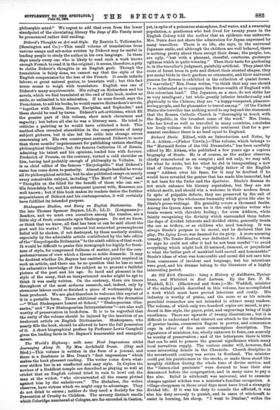philosophic mind." We re g ret to add that even from the
lower yet, in spite of a poisonous atmosphere, foul water, and a swarming standpoint of the circulating library The Days of His Vanity must population, a gentleman who had lived for twenty years in the be pronounced rather dull reading. English Colony told the author that an epidemic was unknown. Diderot's Thoughts on Art and Style. By Beatrix L. Tollemache. Mrs. Dunn does not share the admiration for Japan expressed by (Remington and Co.)—This small volume of translations from many travellers. There is no life, she says, in the universal various essays and art-notes written by Diderot may be useful in Japanese smile, and although the children are well behaved, there leading people to study the author in his own language. In these is nothing pretty about them except their dress; the people, too, days nearly every one who is likely to read such a work knows are ugly, " but with a pleasant, cheerful, courteous, grotesque enough French to read it in the original ; it seems, therefore, a pity ugliness which is quite winning." Then their taste for gardening to clothe Diderot's thoughts in an English garb. Though the is, in the traveller's judgment, painfully artificial. They plant the
translation is fairly done, we cannot say that the style of the roots of forest trees in pots and distort their stunted shapes, they
English compensates for the loss of the French. It needs infinite put metal birds in their gardens as ornaments, and their universal labour, or great natural genius, to translate well ; but this fact passion for flowers is exhibited in the collection of quaint forms. never seems to weigh with translators. English was one of "I marvelled;' Mrs. Dunn writes, "to think that any one should Diderot's many acquirements. His eulogy on Richardson and his be so infatuated as to compare the flower-wealth of England with novels, which we find translated at the end of this book, makes us this colourless land." The Japanese, as a race, do not strike her smile, so unlimited is his admiration. If he were forced, says the as very intelligent ; but while greatly inferior intellectually and Frenchman, to sell his books, he would reserve Richardson's novels, physically to the Chinese, they are " a happy-tempered, pleasure- "together with Moses, Homer, Euripides, and Sophocles," and loving people, and far pleasanter to travel among." Of the United these should be read by turns. Diderot's art-criticisms, which fill States the traveller has nothing novel to say beyond the statement the greater part of this volume, show much cleverness and that the Roman Catholic Church is " thoroughly in touch with sagacity; but before all else he was a literary man. He tried to the Republic, in the broadest sense of the word." Mrs. Dunn,


















































 Previous page
Previous page